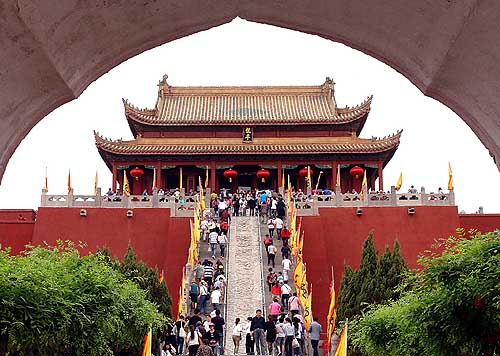|
Culture-oriented tourism
 |
|
GO TRAVELING: A tourist site in Kaifeng, Henan Province, attracts more tourists than before during this year's Labor Day holiday (WANG SONG) | The year 2011 also marks the National Tourism Year in China, which has Traveling in China and Appreciating Its Culture as its theme. On January 1, the China Cultural Tour 2011 was launched simultaneously in five provinces, including Guizhou, Jiangsu, Fujian, Shandong and Henan.
"With a civilization of 5,000 years, China boasts a total of 40 world cultural and natural heritage properties, 657 national intangible cultural heritage items, 2,351 major historical and cultural sites under state protection, and 360 cities, towns and villages noted for their historical and cultural resources," said Shao Qiwei, Chairman of CNTA. "This year we will develop publicity activities in various forms in more than 140 countries to show China's rich tourist resources and its cultural heritage."
Against this background, many cities have put on display tourism products with unique cultural charm. Nanjing, capital city of Jiangsu Province, once the capital of six dynasties—Wu Kingdom, Eastern Jin, Song, Qi, Liang and Chen (211-589)—has been a popular tourist city for a long time. The city's tourism revenues reached 468.5 billion yuan ($72 billion) last year, ranking first in the country.
Nanjing's neighboring city Suzhou—the famous Oriental Waterside City—hosted its 14th International Tourism Festival from April 21 to May 1.
With a history as a city of over 3,000 years and a history as a capital of more than 850 years, Beijing is of course not willing to lag behind. "Each year the municipal government allocates 1 billion yuan ($1.54 billion) to promote the development of the tourist industry," said Lu Yong, Director of the Beijing Tourism Development Committee. "We're strengthening cooperation with international tourism organizations to construct a chain linking Beijing with other tourist cities in the world. Meanwhile, we are encouraging transnational tourism corporations to set up branches here."
Beijing has also set in place ambitious plans. By 2015, net tourist output value will make up 10 percent of its GDP, and the city will receive 200 million domestic travellers and 10 million international arrivals. This will provide annual income of $10 billion.
Southwestern provinces, such as Yunnan and Guizhou, also present a variety of tourism activities and events based on their unique natural and cultural heritage.
Along with the tourism hubbub, a vote for the most famous Chinese cultural cities is also under way online. "A cultural city shouldn't be a dead historical site," said Yu Dan, a scholar with Beijing Normal University and a member of the voting jury. "Hangzhou is a good example. Despite rapid industrial development, it never loses its cultural tradition, as it has been deeply rooted in people's lives."
High-end travel
During recent years, high-end travel has been in vogue in China. "It first arose in Guangzhou, capital city of Guangdong Province. The market is still shaping up, but the prospects are infinitely bright," said Yuan Jianxiong, General Manager of China's first travel agency for high-end travel services, which is headquartered in Guangzhou.
"Consumers are not satisfied with sightseeing alone any more; they choose to pay more for exceptional and individual services during their tour," said Wei Xiaoan, Director of the Academic Committee of China Tourism Academy.
Wei Xiang, a researcher with the School of Tourism Management under Beijing International Studies University, has expressed a different view. "High-end travel doesn't necessarily mean excessive consumption in luxury hotels or liners," he said. "To a degree, it's a new travel experience guaranteed by more attentive, higher-quality service at a reasonable price."
"In Beijing more people are looking for luxury travel experiences, while demanding higher quality of food, service and accommodation," said Zhang Huiguang, former Director of the Municipal Tourism Bureau. "Beijing is improving its facilities to meet travelers' demand." |
